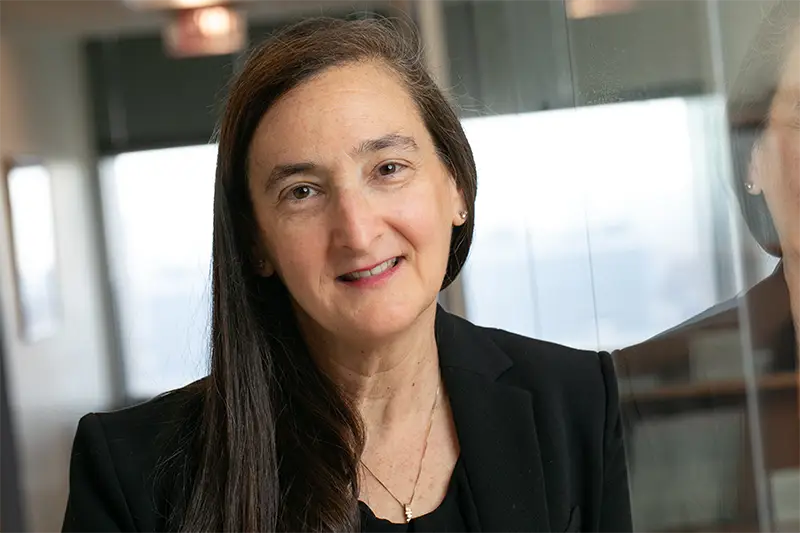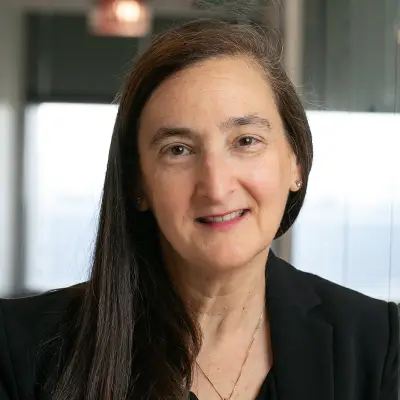Dawn Hershman, M.D., M.S., chief of the Division of Hematology/
Dr. Hershman is this year’s recipient of the prestigious Karnofsky Memorial Award from the American Society of Clinical Oncology (ASCO), one of the highest honors in oncology. The award recognizes her groundbreaking research on cancer care delivery and treatment adherence and her deep commitment to the patients she serves.
In her address at this year’s ASCO annual meeting, she will share how the journey of a single breast cancer patient whom she treated early in her career inspired countless questions that would come to shape her research. For Dr. Hershman, research isn’t just about data or discoveries; it’s about listening. “The most meaningful issues patients face, they tell you,” she explains. “If that drives your research, you will have an impact.”

Dr. Dawn Hershman will address the audience at the 2025 ASCO Annual Meeting to share how her direct experiences with patients have shaped her research.
Putting Patients at the Center
Throughout her career, Dr. Hershman has focused on the real-world challenges that patients face — issues that are often overlooked in clinical trials. She has dedicated much of her research to understanding why patients struggle to access or adhere to their treatments, whether due to side effects, financial barriers, or gaps in the healthcare system. “We have all these great therapies that work,” she says, “but people don’t get them. They can’t get them. They don’t take them. They don’t finish them. If we really want to change outcomes, we need to focus on all of that as well.”
Her work has led to concrete solutions, including strategies to improve adherence to hormone therapy in breast cancer patients — one of the most effective treatments for preventing recurrence, yet one that many patients discontinue early due to side effects or cost. Dr. Hershman is also at the forefront of financial toxicity research, demonstrating how high out-of-pocket costs prevent patients from staying on life-saving treatments. Through her studies, she has worked to identify policy and healthcare system changes that can reduce these financial burdens and improve patient outcomes.
In medicine, we’re constantly trying to solve problems. With each answer, we realize how much more there is to understand. That’s what drives me.
— Dr. Dawn Hershman
In addition to treatment adherence and access, Dr. Hershman also researches integrative approaches for symptom management, particularly acupuncture for cancer-related pain and side effects. She has led landmark clinical trials showing that acupuncture can significantly reduce joint pain in breast cancer patients undergoing aromatase inhibitor therapy — offering an effective, non-pharmacologic option for managing a side effect that often leads patients to discontinue treatment.
Putting the patient experience at the center of her research, Dr. Hershman has helped shift the conversation in oncology research, ensuring that treatment advances translate into real-world benefits for those who need them most.
Bringing Voices Together to Solve Problems
Dr. Hershman’s impact extends beyond research and clinical care — she is also a dedicated mentor and leader. She understands, from personal experience, the power of encouragement and inclusion. “Most people doubt what they can do,” she says. “But if you can surround yourself with people who are open-minded and supportive, you realize you can do things you never thought possible.”
She believes that great research happens when diverse perspectives come together, each offering a slightly different way of looking at a problem. That belief has shaped her leadership both as chief of the Division of Hematology/
For Dr. Hershman, the Karnofsky Award is not just a recognition of past achievements — it’s a reminder of the work ahead. “In medicine, we’re constantly trying to solve problems,” she says. “With each answer, we realize how much more there is to understand. That’s what drives me. That’s what keeps me going.”
A version of this article originally appeared on the Columbia University Herbert Irving Comprehensive Cancer Center website.




